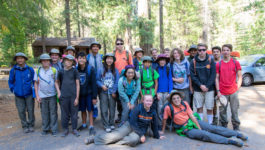As described in the Uniform section, scouts need to be in the proper attire at each meeting. In addition scouts are to bring their Scout Handbook to every meeting. Scouts are encouraged to get in the habit of bringing the “ten meeting essentials” with them to meetings. The 10 essentials to bring to Troop meetings should be kept in a fanny pack or small day-pack (keep all items in one pack, then grab it and go!):
- Scout Handbook (needed for reference or to have advancement signed off)
- Pencil or pen (to take notes, record attendance, write plans, etc.)
- Notepad (for notes, important reminders, etc.)
- Compass (Be prepared! You never know when we will have an orienteering exercise!)
- Matches or fire starter (Be prepared!)
- Pocketknife (after Totin’ Chit has been earned – Be prepared!)
- First Aid Kit (small, personal kit – Be prepared!)
- Emergency blanket (also known as “space blanket”. Be prepared!)
- Flashlight (Be prepared! Extra batteries and bulbs are also a nice touch.)
- 20-50 feet of Paraline cord.
These should also be taken on outings along with other requirements (see the 10 essentials for camping and hiking listed in the Scout Handbook, and see guidance on our website). Remember that the “10 essentials” are always situational. There is overlap, but the essentials for a winter camping trip will be different from a summer campout or a short hike.
Health Forms are required by BSA for scouts and leaders attending outings and camp. Part A is the Annual BSA Health and Medical Record which is completed/updated each year by the parents and includes actual dates of the scout’s latest immunizations. Part B contains releases and authorizations signed by the parents. Part C is the Physical Examination completed and signed by a physician. It is required for events exceeding 72 hours (such as our summer camp) or for participation in strenuous activities and is valid for 12 months. Be sure to schedule physician visits early to ensure completion before summer camp. Parents should provide other updates, such as a change in health insurance, as needed. It is a good idea to keep a photocopy of the completed forms, as the forms will be required if the scout goes to other scout camps.
Use a recipe box (the kind that holds 3” x 5” cards) to file completed merit badge cards. The dates that badges are earned are required on the Eagle application, and the blue cards are the scout’s official records. The scout can also record other information, such as service hours and outing participation on index cards in the file. Alternatively, some scouts collect their merit badge cards in a binder using plastic collector card pages like those used for trading cards, or put them in a zip-lock bag that they keep in a special place.
Write the scout’s name on the pages in the Scout handbook where the rank requirements are signed off (just in case the pages fall out!) Periodically make a photocopy of the pages and keep this copy in a safe place, separate from the book. Books are sometimes lost, and having a record of advancement is important.
On outings, especially summer camp, pack clothes in large Zip-Lock bags or waterproof compression stuff-sacks before putting them in the backpack This keeps them clean and dry, and if the scout never changes his clothes they can be put away without washing! The bags can be used over and over again.
Check the flier for each outing, the summer or winter camp packing list and the Boy Scout Handbook for guidance on what to pack for outings or camp. The items needed for scout outings need not be “top of the line”. Many can be found at discount stores, garage sales or used-item stores. When in doubt ask the Scoutmaster or an ASM. Someone in the troop may also have extra gear that can be borrowed on occasion.


